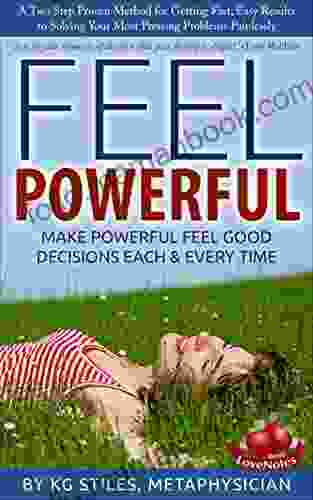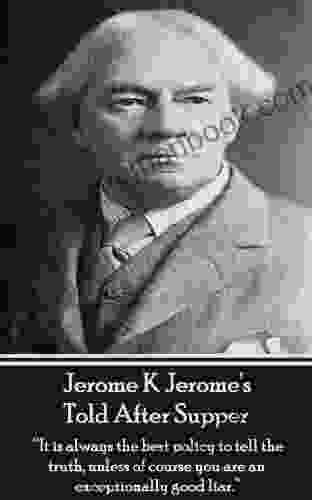It Is Always the Best Policy to Tell the Truth, Unless of Course You Are a Politician

Lying is wrong. It is a betrayal of trust and can damage relationships. However, there are some situations in which lying may be necessary. For example, if you are a politician, you may need to lie to get elected or to stay in office.
Politicians lie for a variety of reasons. They may lie to make themselves look better, to avoid blame, or to protect their careers. They may also lie to appease their constituents or to promote their own agendas.
5 out of 5
| Language | : | English |
| File size | : | 165 KB |
| Text-to-Speech | : | Enabled |
| Screen Reader | : | Supported |
| Enhanced typesetting | : | Enabled |
| Word Wise | : | Enabled |
| Print length | : | 30 pages |
Whatever the reason, lying is never the best policy. It is always better to tell the truth, even if it is difficult or unpopular. Lying will only lead to more problems in the long run.
The Dangers of Lying
Lying can have a number of negative consequences. It can damage your reputation, make it difficult to trust others, and lead to feelings of guilt and shame.
Lying can also damage relationships. If you lie to someone, they may lose trust in you and be less likely to believe you in the future. This can make it difficult to maintain healthy relationships.
In addition, lying can lead to legal problems. If you are caught lying under oath, you could be charged with perjury. This is a serious crime that can result in jail time.
The Benefits of Telling the Truth
Telling the truth is always the best policy. It is the right thing to do and it can have a number of positive benefits.
Telling the truth can help you build trust with others. When people know that they can trust you, they are more likely to be open and honest with you. This can lead to stronger and more fulfilling relationships.
Telling the truth can also help you feel better about yourself. When you are honest with others, you don't have to worry about being caught in a lie. This can lead to feelings of peace and contentment.
In addition, telling the truth can help you avoid legal problems. If you are always honest, you don't have to worry about being charged with perjury.
How to Tell the Truth
Telling the truth is not always easy. However, there are a few things you can do to make it easier.
First, be honest with yourself. If you are not honest with yourself, it will be difficult to be honest with others.
Second, be respectful of others. When you are telling the truth, be mindful of how your words will affect others. Avoid being hurtful or disrespectful.
Third, be prepared to face the consequences. Telling the truth can sometimes be difficult, but it is always the right thing to do. Be prepared to face the consequences of your honesty, even if they are not what you want.
It is always the best policy to tell the truth. Lying can have a number of negative consequences, while telling the truth can have a number of positive benefits. If you want to live a life of integrity and trust, always tell the truth.
5 out of 5
| Language | : | English |
| File size | : | 165 KB |
| Text-to-Speech | : | Enabled |
| Screen Reader | : | Supported |
| Enhanced typesetting | : | Enabled |
| Word Wise | : | Enabled |
| Print length | : | 30 pages |
Do you want to contribute by writing guest posts on this blog?
Please contact us and send us a resume of previous articles that you have written.
 Top Book
Top Book Novel
Novel Fiction
Fiction Nonfiction
Nonfiction Literature
Literature Paperback
Paperback Hardcover
Hardcover E-book
E-book Audiobook
Audiobook Bestseller
Bestseller Classic
Classic Mystery
Mystery Thriller
Thriller Romance
Romance Fantasy
Fantasy Science Fiction
Science Fiction Biography
Biography Memoir
Memoir Autobiography
Autobiography Poetry
Poetry Drama
Drama Historical Fiction
Historical Fiction Self-help
Self-help Young Adult
Young Adult Childrens Books
Childrens Books Graphic Novel
Graphic Novel Anthology
Anthology Series
Series Encyclopedia
Encyclopedia Reference
Reference Guidebook
Guidebook Textbook
Textbook Workbook
Workbook Journal
Journal Diary
Diary Manuscript
Manuscript Folio
Folio Pulp Fiction
Pulp Fiction Short Stories
Short Stories Fairy Tales
Fairy Tales Fables
Fables Mythology
Mythology Philosophy
Philosophy Religion
Religion Spirituality
Spirituality Essays
Essays Critique
Critique Commentary
Commentary Glossary
Glossary Bibliography
Bibliography Index
Index Table of Contents
Table of Contents Preface
Preface Introduction
Introduction Foreword
Foreword Afterword
Afterword Appendices
Appendices Annotations
Annotations Footnotes
Footnotes Epilogue
Epilogue Prologue
Prologue Pierre Mora
Pierre Mora David J Vaughan
David J Vaughan Michele Gilcrest
Michele Gilcrest Tim Cooper
Tim Cooper D D Peters
D D Peters Alan J Harrison
Alan J Harrison Martin Bachmeier
Martin Bachmeier Subhash Chandra
Subhash Chandra Cathy Cash Spellman
Cathy Cash Spellman Pam Denicolo
Pam Denicolo Gurpreet Ahluwalia
Gurpreet Ahluwalia Franca Storm
Franca Storm Golden Angel
Golden Angel Christina Escamilla
Christina Escamilla Sandra Mcmillan
Sandra Mcmillan Mark Pellegrini
Mark Pellegrini Elaine Kahn
Elaine Kahn Angela Magara
Angela Magara Jeffrey S Bachman
Jeffrey S Bachman Alan Dean Foster
Alan Dean Foster
Light bulbAdvertise smarter! Our strategic ad space ensures maximum exposure. Reserve your spot today!
 Stan WardFollow ·2.8k
Stan WardFollow ·2.8k Terry BellFollow ·11.6k
Terry BellFollow ·11.6k Chadwick PowellFollow ·18.8k
Chadwick PowellFollow ·18.8k Ernest PowellFollow ·14.2k
Ernest PowellFollow ·14.2k Virginia WoolfFollow ·10k
Virginia WoolfFollow ·10k Gordon CoxFollow ·11.1k
Gordon CoxFollow ·11.1k Clarence MitchellFollow ·15.2k
Clarence MitchellFollow ·15.2k John ParkerFollow ·7.7k
John ParkerFollow ·7.7k

 Dean Cox
Dean CoxHow to Make Decisions Easily & Effortlessly: The...
The Different Types of Decisions There...

 Gustavo Cox
Gustavo CoxThe End of World War II and the Birth of Baseball's...
The end of...

 Patrick Rothfuss
Patrick RothfussThe Dantes: An 11-Family Saga of Billionaires, Soulmates,...
The Dantes is an epic family saga that follows...

 Dylan Mitchell
Dylan MitchellSuper Friends: The Animated Adventures That Defined a...
In the vibrant landscape of American...

 Jamal Blair
Jamal BlairCollege For Students With Disabilities: We Do Belong
College can be a...
5 out of 5
| Language | : | English |
| File size | : | 165 KB |
| Text-to-Speech | : | Enabled |
| Screen Reader | : | Supported |
| Enhanced typesetting | : | Enabled |
| Word Wise | : | Enabled |
| Print length | : | 30 pages |














